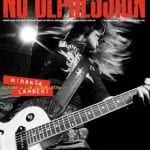Gina Villalobos – Miles of music
In some ways, Gina Villalobos is a child of the California country-rock-singer-songwriter ’70s. She grew up in Lake Sherwood, California, just northwest of Malibu; her mother, a clinical hypno-therapist by training, would host small parties where musicians such as Billy Joe Walker and Jack Spears would hang out on the porch and play Willie, Waylon and Linda Ronstadt tunes.
“If you can envision what Laurel Canyon would have been like, that’s how it was,” she says. “We ran free through the fields and swam in the lake. When I lived there, there was nothing, just ranches, fields and coyotes. Now there are strip malls and car dealerships.”
Music gradually got under Villalobos’ skin. “I was probably 9 years old when I started playing guitar but I didn’t start writing songs till I was 20,” she says. “Being in college, I just came in touch with who I am. I always was a musician and songwriter, but then I got it: Oh, this is who I am!”
She never finished college at UC-Santa Barbara; her folk-rock trio Liquid Sunshine (which later became the Mades) was doing well enough that she could tour around the state. “I was 22 and having the time of my life,” she says. Those bands eventually dissolved, and in 2004 she released her first solo album, Rock ‘N’ Roll Pony, which transformed her from a California folkie to a California country-rocker, with a voice like dirt and gold dust. Her songs sometimes anticipated, sometimes reflected how tenuous and unpredictable every moment of life can be.
In October 2003, midway through recording that album, Villalobos had a work accident that shattered her right eye. Despite multiple operations, the surgeons couldn’t reattach her retina. She’s now 100 percent blind in that eye and continues to experience retinal flashing, like a flash bulb going off one side of her brain.
“It’s annoying but you get used to it,” she says. “Everyone is right or left-eyed, like you’re right or left-handed. Any kind of eye-hand coordination, tying my shoes, pouring a cup of coffee, I had to relearn all of that. Maybe people like to think your other senses get heightened. What happened to me is I got nauseous and threw up on a dime. I don’t have bionic hearing.
“But to give you the most cliched answer,” she continues, “I learned that your entire life can change in an instant. I’m not so sure that’s a good thing to learn. I have a lot of anxieties and fears from it. I would be embarrassed to tell you all the things I stress out about now. It makes me think something’s going to happen to me all the time.”
Miles Away was released last year in Europe (where Villalobos has built a following that outpaces her stateside recognition) and became available in the U.S. on Face West in March. The new disc pushes, urgently and intensely, past her previous recordings. Working with longtime friend Erik Colvin, Villalobos recorded the album between tours in small-budget studios in California.
“It’s Erik’s job to squeeze the most out of me, to guide me and coach me; I trust him 100 percent,” she says. “But people would freak out if they saw where we tracked. Cole Studios is just a rehearsal studio, with tight spaces, to get that tight drum sound, which I like. Most of the vocals were two or three takes, or less. You can capture a mood once or twice. After that you lose some soul.
“As you get older, you learn that you don’t need to oversing. You let the performance be what it is. Over the years I’ve learned not to try so hard.”
Perhaps because of her smoked-out and scratched-up voice, Villalobos is often compared to Lucinda Williams, though Lucinda has never made a record with the kind of hard kicks and harder hooks that can close up, if not cancel out, the superficial distance between pop and roots, between insider and outsider art. If she had, it would sound something like Miles Away, a country pop record of racing guitars and choruses, with sharpness at its gleaming edges and real demons on its trails.
On “Face On The Sheets”, Villalobos sings, “I can’t brush off this stain/Someone tape up my face again.” On “Don’t Let Go,” she delivers the lines, “I’ll disappear like magic in a day/Stare back at my half of face” as if she’s discovering something only a song can say. On Miles Away, even as her band lifts and builds all around her, she’s peeling back layer after layer, skin after skin, to find out what really is inside.
“My songs feel like trapped secrets inside of me,” she says. “They decide to reveal themselves of their own will. It’s like a face-off between me and my own inner reality. I mean, I don’t think most artists know the meaning of their own art. My songs just kind of come through me, and I don’t judge them or analyze them. Whatever meaning is there is way beyond the lyrics. It’s what’s said between the spaces.”




